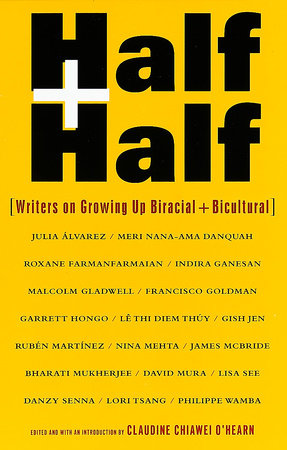Excerpt
Half and Half
INTRODUCTION I was walking down the street the other day, on my way home from the gym, when a large woman with wiry hair run amok approached me, mumbling to herself and looking somewhat deranged, as only New Yorkers can look. As she neared me, she looked me in the eye and barked, “Half-breed bitch.” I had already passed her by the time I figured out what she had said. Shocked, my first reaction was a mix of surprise and even pleasure: “How’d she know? What gave it away?” It wasn’t until a block later that I became enraged and thought of a witty retort.
I stopped being American when I first came to the States to live eight years ago. Growing up in Asia, I knew being mixed set me apart, but I didn’t have to name it until people began to ask, Where are you from? My father was raised in a working-class Irish American family in Fall River, Massachusetts. My mother was born near Shanghai, China, but when she was seven, on the eve of the communist revolution, she and her family fled to Taiwan. They met, romantically, and I think aptly, on an airplane (my mother was a flight attendant) and soon married—though not without first encountering resistance. My father’s family were familiar with only stereotypes of Asian women, and so were not eager to invite China into the O’Hearn fold. My mother’s family felt the same and took it a step further by hiring a private detective, who fortunately was unable to dig up anything incriminating about my father. Both sides eventually got over it, so we can laugh about it now, and frequently do. Following my mother’s example, both of her sisters married Caucasians, creating a whole generation of
hapas (Hawaiian for half) in our family.
My parents settled in Hong Kong, where I was born, and moved to Singapore, Belgium, and Ohio and finally settled in Taiwan. I consider these all to be home, with the exception of Akron, Ohio, where I experience my first sting of racism when preschool classmates pushed me off playground slides, pulled tight their eyes, and idiotically chanted, “Ching, Chang, Chong, Chinese.” Early learners. As coached by my mother, I retorted, “Chinese are better.” But since these places are all home, they forfeit their definition as a single place I can come from. Suspended, I can go anywhere but home.
I don’t look especially Chinese—my eyes are wide and lidded, and my hair has a Caucasian texture and color. When my mother and I walked together, people would stare, often rudely. I could see questions in their curious looks: “Is this your daughter?” We looked incongruous. It never occurred to me that my mother and I looked any more different than any other mother and daughter; and even if we did, that it would affect how we related to each other. I don’t think I minded so because I assumed that I would find a home in the States when I went there for college. To me, America was summer vacations; getting up at six in the morning to watch
Scooby Doo and the rest of the Saturday morning cartoons; eating Pop Rocks and macaroni and cheese (which I would inhale in large amounts); and best of all, shopping at the mall. Coupled with what I saw in the movies, this was my small window into American life.
Because most people didn’t know where to place me. I made up stories about myself. In bars, cabs, and restaurants I would try on identities with strangers I knew I would never meet again. I faked accents as I pretended to be a Hawaiian dancer, an Italian tourist, and even once a Russian student. It always amazed me what I could get away with. Being mixed inspired and gave me license to test new characters, but it also cast me as a foreigner in every setting I found myself in.




